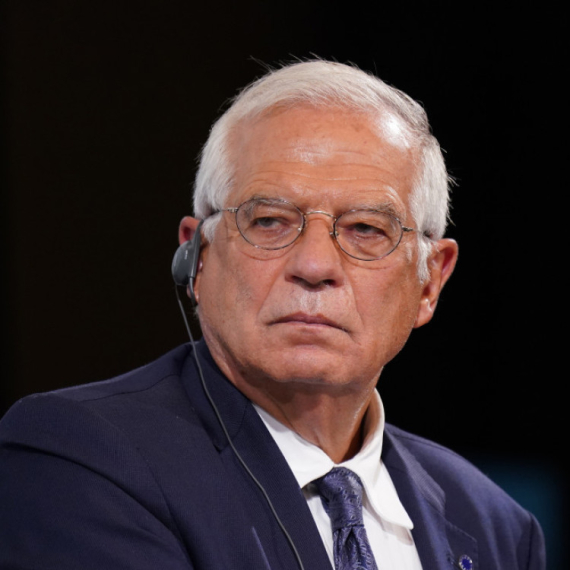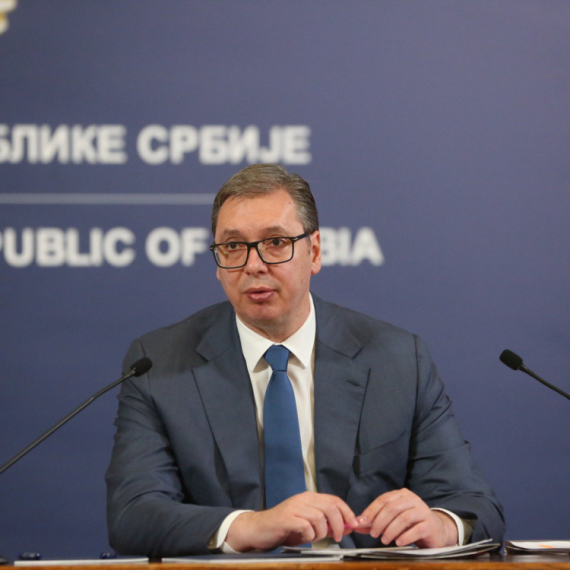Emergency session can't be called, says speaker
Acting speaker Jovan Krkobabić, PUPS, says he does not have the power to call an emergency session of parliament.
Tuesday, 17.06.2008.
13:08

Acting speaker Jovan Krkobabic, PUPS, says he does not have the power to call an emergency session of parliament. He stated that neither the Constitution nor Code of Procedure envisaged such a move. Emergency session can't be called, says speaker On Monday, the Democratic Party of Serbia-New Serbia (DSS-NS), with the support of the Serb Radical Party (SRS), submitted an initiative to parliament to call an emergency session to decide whether to pass a ruling declaring the Kosovo constitution null and void and rejecting the deployment of the EULEX mission. Krkobabic, as the oldest MP, presided over parliament’s constitutive session where MP mandates were verified, and then adjourned the session because of the lack of a parliamentary majority to elect a speaker or other parliamentary organs. He reiterated that no MP clubs had yet to be constituted other than that of the SRS, and, as a result, he could not even schedule consultations with them. The acting speaker, who is the leader of the Associated Pensioners’ Party, believes that parliament can be fully constituted once a parliamentary majority has been established, after which parliament could function normally. “For now, the situation is delicate, and my hands are tied, but, as a serious individual, I cannot act outwith the Constitution or Code of Procedure,“ he stressed. According to the Constitution, verification of MP mandates means that parliament has been constituted, but the Code of Procedure stipulates that the process of parliamentary constitution, which takes place at the first session, includes the election of a speaker, deputy speaker, working bodies, and a secretary. The first session’s agenda, called by former Speaker Oliver Dulic, is defined by the Constitution and the Code of Procedure, and cannot be altered. The Code of Procedure envisages that the first session should be chaired by the parliament’s oldest MP—Krkobabic, in this case—until a new speaker is chosen. This rule also states that the scheduling of parliamentary sessions falls within the speaker’s jurisdiction, who “via letter, sets the date and time of a parliamentary session, with a proposed agenda, at least seven days in advance of the scheduled session.” In extreme cases, notification of a session’s date and the agenda can be delivered earlier, in which case the speaker must explain his actions at the beginning of the session in question. As parliament is currently in a period of emergency session, the scheduling of a session requires the support of at least one-third of MPs, or a government motion. Earlier today, parliament experts ruled that the acting speaker did not have the power to call an emergency session. The DSS yesterday submitted a motion to all MPs calling for an emergency session to be scheduled to declare the Kosovo constitution null and void, and to reject the deployment of the EULEX mission. After receiving the request, Krkobabic announced consultations with parliamentary experts who informed him that he was not authorized to call a session, Parliamentary Secretary Tamara Stojcevic told B92. She said that “his powers and rights and obligations expire with the election of a speaker, and he only has those powers at the first, constitutive session.“ “Obviously, as acting speaker, he can hold consultations with the biggest MP club, but the problem there is that not all the clubs have yet been formed. Currently, there is only the SRS club and that of the minorities, so that, once again, he would not have any room for a formal agreement with parliamentary groups,“ explained Stojcevic. By accepting the DSS proposal, parliament would confirm that Serbia does not accept the legalization of the EULEX mission, because the mission’s main objective would be to apply the Ahtisaari Plan envisaging the illegal secession of a part of Serbia, which was an integral and sovereign state, a member of the UN, to whom all international policies and laws applied, as well as the Serbian constitution. By adopting this decision, parliament would annul the Constitution of the Republic of Kosovo that came into force on Saturday, and was adopted by the province’s temporary institutions. Jovan Krkobabic (FoNet, archive)
Emergency session can't be called, says speaker
On Monday, the Democratic Party of Serbia-New Serbia (DSS-NS), with the support of the Serb Radical Party (SRS), submitted an initiative to parliament to call an emergency session to decide whether to pass a ruling declaring the Kosovo constitution null and void and rejecting the deployment of the EULEX mission.Krkobabić, as the oldest MP, presided over parliament’s constitutive session where MP mandates were verified, and then adjourned the session because of the lack of a parliamentary majority to elect a speaker or other parliamentary organs.
He reiterated that no MP clubs had yet to be constituted other than that of the SRS, and, as a result, he could not even schedule consultations with them.
The acting speaker, who is the leader of the Associated Pensioners’ Party, believes that parliament can be fully constituted once a parliamentary majority has been established, after which parliament could function normally.
“For now, the situation is delicate, and my hands are tied, but, as a serious individual, I cannot act outwith the Constitution or Code of Procedure,“ he stressed.
According to the Constitution, verification of MP mandates means that parliament has been constituted, but the Code of Procedure stipulates that the process of parliamentary constitution, which takes place at the first session, includes the election of a speaker, deputy speaker, working bodies, and a secretary.
The first session’s agenda, called by former Speaker Oliver Dulić, is defined by the Constitution and the Code of Procedure, and cannot be altered.
The Code of Procedure envisages that the first session should be chaired by the parliament’s oldest MP—Krkobabić, in this case—until a new speaker is chosen.
This rule also states that the scheduling of parliamentary sessions falls within the speaker’s jurisdiction, who “via letter, sets the date and time of a parliamentary session, with a proposed agenda, at least seven days in advance of the scheduled session.”
In extreme cases, notification of a session’s date and the agenda can be delivered earlier, in which case the speaker must explain his actions at the beginning of the session in question.
As parliament is currently in a period of emergency session, the scheduling of a session requires the support of at least one-third of MPs, or a government motion.
Earlier today, parliament experts ruled that the acting speaker did not have the power to call an emergency session.
The DSS yesterday submitted a motion to all MPs calling for an emergency session to be scheduled to declare the Kosovo constitution null and void, and to reject the deployment of the EULEX mission.
After receiving the request, Krkobabić announced consultations with parliamentary experts who informed him that he was not authorized to call a session, Parliamentary Secretary Tamara Stojčević told B92.
She said that “his powers and rights and obligations expire with the election of a speaker, and he only has those powers at the first, constitutive session.“
“Obviously, as acting speaker, he can hold consultations with the biggest MP club, but the problem there is that not all the clubs have yet been formed. Currently, there is only the SRS club and that of the minorities, so that, once again, he would not have any room for a formal agreement with parliamentary groups,“ explained Stojčević.
By accepting the DSS proposal, parliament would confirm that Serbia does not accept the legalization of the EULEX mission, because the mission’s main objective would be to apply the Ahtisaari Plan envisaging the illegal secession of a part of Serbia, which was an integral and sovereign state, a member of the UN, to whom all international policies and laws applied, as well as the Serbian constitution.
By adopting this decision, parliament would annul the Constitution of the Republic of Kosovo that came into force on Saturday, and was adopted by the province’s temporary institutions.
























































Komentari 2
Pogledaj komentare